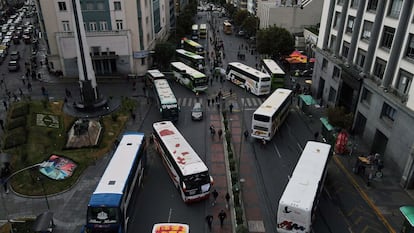Total war between Bolivia’s former allies: road blocks led by Evo Morales stifle the government of Luis Arce
The country has endured 11 days of protests since the former president was banned from running again, even as the crisis over elections to choose new judges deepens

For 11 days, Bolivia’s main highway, which connects the administrative capital, La Paz, with the prosperous Santa Cruz de la Sierra, has been blocked by peasants who follow former president Evo Morales. There are also less significant cuts on other roads in the country. The protest has caused fuel shortages, price increases and economic losses estimated at $600 million. The protests have put President Luis Arce up against the ropes; previously described as “Brother Lucho,” these days Arce is considered a “traitor” to the movement led by the leftist Morales, who was in power from 2006 to 2019. The government has chosen not to repress the road blocks, which it considers “part of the country’s political culture.” Arce, of the Movement for Socialism (MAS), is confident that these will dissolve on their own as the Carnival, which is a very important holiday for Bolivians, approaches. The protesters’ demands have to do with the legal inability of the former president to run for office in 2025; he was disqualified by the Plurinational Constitutional Court (TCP), the institution against which the protesters are crashing.
In recent days, the pro-Evo farmers have tried to increase the number of road cuts to increase pressure on the authorities, who, for their part, have denounced that the majority of the blockade points were established by coca growers who were “carried” there by their leaders from Chapare, the coca-growing area of Cochabamba and Morales’ stronghold. According to the government, the movement’s strength has been reduced to what it was in the 1990s, when Morales was a cocalero leader and had not yet formed MAS.
“We are tired of the Bolivian justice system, which only cheats,” one of the protesters declared on television. The road that could be seen next to this protester was full of stones laid down there the previous days to block traffic. In other countries, such acts are considered crimes, but not in Bolivia. At least not until now. In the midst of the current conflict, business leaders presented a bill to punish road blocks with jail time, on the grounds that they prevent the transfer of goods and cause significant losses to producers and sellers. Simultaneously, the Vice Minister of Government Coordination and Management, Gustavo Torrico, declared that “road blockades are almost a part of Bolivia’s culture. The problem is, why are these road blocks being created? If it is to protest against a dictatorship, for example, the people have every right to do so, but if it is a personal matter, like the disqualification [of Evo Morales], it is wrong.”
The protesters are demanding the resignation of all judicial courts in the country, starting with the TCP. For the government, what they are really after is a way to cancel a constitutional ruling, 1010/2023, approved in December of last year, which prohibits a president from being in office for more than two terms, whether consecutively or not. This clause removed Morales, who has already held power three times, from the running.
The request for the general resignation of the higher courts is based on the fact that the terms of its members constitutionally ended on December 31, 2023. Shortly before this date, the TCP approved the sentence that disqualifies Morales and issued other decisions that benefit the government. Finally, the court ordered its own extension and that of the other courts, until parliament manages to organize judicial elections. These were to be held in 2023, but the Legislative Assembly was unable to call them. The pro-Evo protesters believe that the continuity of the judges in their posts is illegal and that it is the price they have charged in exchange for disqualifying Morales.
Bolivia has had judicial elections every six years since the approval of its new Constitution in 2009. It is the only country in the region that elects its senior judges in this way. The elections that were scheduled for last year were canceled because the Legislative Assembly did not have the majority it needed, two-thirds of the votes, to approve them. This majority became unattainable due to the division of the once hegemonic MAS into two branches, one under Morales and the other one behind Arce.
Sign up for our weekly newsletter to get more English-language news coverage from EL PAÍS USA Edition
Tu suscripción se está usando en otro dispositivo
¿Quieres añadir otro usuario a tu suscripción?
Si continúas leyendo en este dispositivo, no se podrá leer en el otro.
FlechaTu suscripción se está usando en otro dispositivo y solo puedes acceder a EL PAÍS desde un dispositivo a la vez.
Si quieres compartir tu cuenta, cambia tu suscripción a la modalidad Premium, así podrás añadir otro usuario. Cada uno accederá con su propia cuenta de email, lo que os permitirá personalizar vuestra experiencia en EL PAÍS.
¿Tienes una suscripción de empresa? Accede aquí para contratar más cuentas.
En el caso de no saber quién está usando tu cuenta, te recomendamos cambiar tu contraseña aquí.
Si decides continuar compartiendo tu cuenta, este mensaje se mostrará en tu dispositivo y en el de la otra persona que está usando tu cuenta de forma indefinida, afectando a tu experiencia de lectura. Puedes consultar aquí los términos y condiciones de la suscripción digital.








































